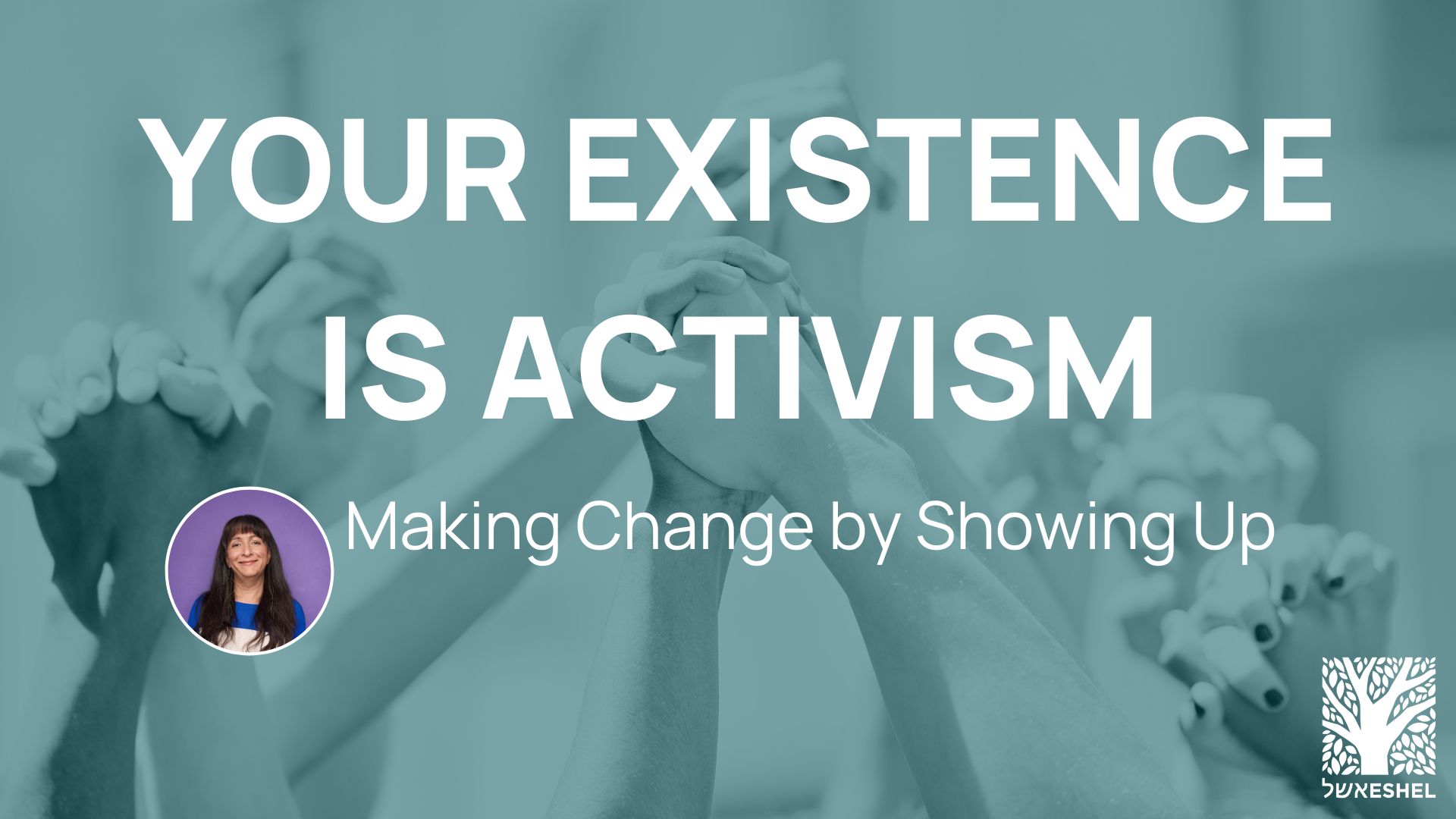
I was raised in an Orthodox home, and transitioned in 1990. In 1986 I stopped all Jewish observance. I was certain I’d never be welcome in an Orthodox shul or community if I was significantly different in any visible way.
1986 was the height of AIDS activism, which aimed for a large audience: The United States. Playing to the general public needed a very bold approach. So, the world famous 1990s group Queer Nation held kiss-ins, marches, protests, and various other types of actions. They became famous for popularizing the rallying cry: “We’re Here! We’re Queer! We’re Fabulous, Get Used To It!”
In 2008, on the second day of Pesach, I ventured into a shul near my apartment. I was betting that the world had changed a tiny, tiny little bit. It still has a long way to go—especially the Orthodox world.
But, just as an exercise in looking at an issue from another point of view: close your eyes–OK, open them again to continue reading, finish this paragraph, THEN close your eyes–imagine hearing outside your synagogue on a Shabbat morning during davening: “We’re Here! We’re Queer! We’re Fabulous, Get Used To It.” How do you think that’d go over with the congregation? Have you imagined it? OK, let’s move on.
Before I found my spiritual home, I used to go to a hashkama (early morning) minyan in a “black hat” shul on Shabbat morning. No one there ever gave me a problem. One guy who found out I was trans was shocked: “You dress modestly, you respect the religious tradition…”. However small a “win” that was, it led to a larger question: Does tznius, often defined as modesty, refer only to clothing? Perhaps another facet of modesty is not making an issue of oneself in the context of a congregation. How does that square with being out as an LGBTQ+ Jew in an Orthodox community?
Due disclosure: I perform standup comedy about being Ortho, trans, and the “combo platter.” I realize that’s not at all tzniusdik.
For decades comedians have had to “read the room.” Comedians read the room to scope out that night’s audience, and to assess what will or won’t make that audience laugh. LGBTQ+ Jews need to read different kinds of rooms, and not for laughs. You’ll need answers to critical questions like “Is this shul a fit for me?”
You have an advantage over comedians “reading” an audience. You can do a lot of research in advance about a synagogue. A synagogue can be the central part of your spiritual life and Jewish community, so take your time finding the right one. Visit the shul’s website, perform Google searches on the board members, donors, honorees, and others whose names you see associated with the shul. See if there are Yelp reviews–OK, that last one was a joke–and check them out on social media. And don’t forget to get in touch with Eshel’s Welcoming Shuls Project Director, Dr. Sunnie Epstein, who has spoken with over 260 Orthodox rabbis. If she hasn’t spoken to the shul you’re interested in, she can scope it out for you to see if it’s a fit.
If you like what you find in your initial research, visit the shul; if possible, go with a friend. If you’re not sure after the first visit whether that synagogue is for you, go again.
Ask questions of the rabbi, of the membership, of anyone you know who attends the synagogue, regardless of whether they are members. Although you should get a broad spectrum of input, make sure to consult at least some people in your own age range. Someone in their twenties may have different priorities for a synagogue than someone in their fifties.
Every Jewish institution has its own “vibe”, its own culture, and some people’s ideas about inclusion are not necessarily a fit with yours. LGBTQ+ Jews, cis-het Jews, and all the other types come to shul to be with their (little subset of the Jewish) community. There are many variables that factor into a synagogue’s culture, and if one is not a fit for you, it’s also not something to take personally. They may not have known to expect LGBTQ+ folks, and we’re not on everyone’s radar.
By contrast, the Orthodox synagogue I call my spiritual home has, thank God, a pretty healthy LGBTQ+ membership. There are a few members who aren’t on board with the shul’s welcoming policy, but the rabbi is, and the shul is known for being welcoming to LGBTQ+ Jews. The rabbi of our shul even did one of the plugs in Eshel’s 2020 online fundraiser, FunOrthodox.
Among the shul’s members are yeshiva day school and seminary-educated women who come to shul with their (respective) wives and kids. Some people there know I’m trans, and we don’t talk about it often because it’s not always relevant to community conversation. If it becomes relevant I’d bring it up. So far it’s never happened in a public way, but rather in one-on-one conversations, or in a small group.
Being “on the radar” makes a huge difference. You want to be counted? Participate in your community.
When you visit, mingle at the kiddush, introduce yourself to people. If mingling isn’t your thing, try really hard to have a friend go with you. Maybe your friend can help get past any social awkwardness. If you are partnered/married and have a family, introduce them too. Shul is a place people come to be Jewish, and to be with other Jews. In the ideal synagogues–there are some–gender identity and sexual orientation aren’t a factor in welcoming a Jew who wants to be part of the Jewish community.
Make human connections to which others can relate regardless of sexual orientation or gender identity. You and another member are both science fiction fans, or like baseball, or the Rambam? Great! You have the basis to continue talking, and making a friend or ally.
Good! Be your whole self. But sometimes just showing up and being are all that are required to make a profound statement. By virtue of showing up, you’ll have expanded the diversity of the community. Also, once you’ve started to feel comfortable in a shul, regardless of whether or not you’ll have joined, volunteer for things with which they need help. If you can make a small donation, do so.
Synagogues don’t like losing donors, and really don’t like losing people who care about the community, and who bring resources to the table; it’s not always about money. Your skills and talents are part of your whole self too, so bring it all!
Gay and lesbian families can be a difficult subject in some synagogues. Trans-inclusion really triggers some synagogue leaders (and members). There are some with an irrational fear that the trans people are coming to destroy the gender boundaries and separations inherent in Orthodox Judaism.
Defy expectations of the naysayers! Show up at shul like everyone else, dress to fit in. Sit where you believe you belong. If someone complains, talk to the rabbi. Having scoped him out as an ally, or at least as someone who wants you to have Jewish community like his other congregants do, be ready to quietly educate him. If he asks something inappropriate, assume it’s out of ignorance, and be polite.
After two or three years at my home shul, a member with whom I’d barely ever spoken asked if I could talk to her trans nephew who was having problems fitting into his Jewish community. That’s a bigger and more important “win” than the guy at the hashkama minyan who didn’t think it was possible to be Orthodox and trans. Raising awareness is important, but in a religious community, sometimes taking it slow is a better strategy for winning hearts and minds. Tznius combined with your presence, participation, and truth are powerful, stealth activism. Try it. Call us for help. “We’re Here”.

